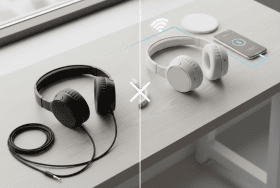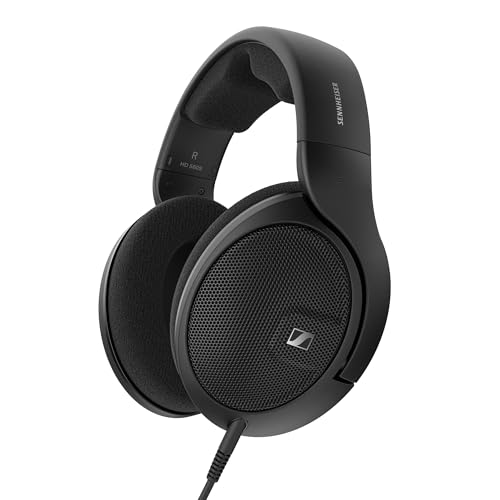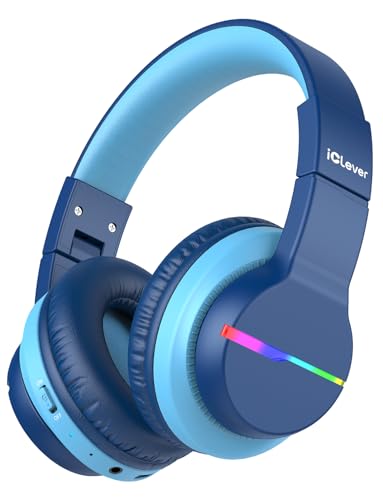![[MK] Draft: Wired vs Wireless Headphones](https://www.market.com/wp-content/uploads/2025/11/-mk-draft-wired-vs-wireless-headphones-1.png)
Choosing between wired and wireless headphones mostly comes down to what matters more to you—sound consistency or everyday convenience. Wired headphones tend to offer more reliable audio with zero lag, which is why a lot of people still prefer them for things like gaming, music production, or just getting the best possible sound without worrying about batteries.
Wireless headphones are all about freedom and ease of use. No cords to untangle, and you can move around more easily—great for workouts, commuting, or just getting things done around the house. The sound quality has gotten a lot better over the years, though in some situations, you might still run into occasional drops or lag.
Wired vs. Wireless Headphones: Quick Comparison
Wired Headphones: Overview
Before Bluetooth took over, wired headphones were the only option. You plugged them into your stereo, Walkman, iPod, laptop, or phone and hit play. These days, wireless headphones dominate the market, but wired models haven’t disappeared — and for good reason. They still offer a few clear advantages, especially for people who care about sound quality or just don’t want to deal with charging another device.
Wired Headphones Pros
- They don’t need charging: One of the biggest perks? No batteries. Plug in and you’re good to go, no matter how long your day is.
- The sound quality is often better: Especially at lower price points, wired headphones usually deliver clearer, more accurate audio. That’s why people in music production and podcasting still rely on them.
- Zero lag: Wired headphones don’t have latency issues, so the sound is immediate — which matters for gaming or editing video.
- More affordable for the quality: Dollar for dollar, wired headphones tend to give you more in terms of sound.
Wired Headphones Cons
- The cable can be annoying: If you’ve ever had your headphones yanked off your head because they got caught on something, you know what I’m talking about.
- Cables wear out: Even with careful use, the cord can fray or break — especially if it gets twisted up in your bag or chewed on by a curious pet.
- Compatibility can be tricky: If you’re using a newer phone like the iPhone 14, you’ll need a dongle or adapter since there’s no headphone jack. That’s one more thing to carry around and not lose.
- Not great for moving around: Wired headphones are less ideal for workouts, commutes, or anything where you don’t want to think about a cable getting in the way.
Who Should Use Wired Headphones?
- Aspiring audio pros: If you’re into music production, podcasting, or anything sound-related, wired headphones like the Sony MDR-7506 are still the go-to. You get the clarity and accuracy you need for serious audio work.
- Anyone on a budget who still wants great sound: If you don’t want to spend a ton but still care about audio quality, wired headphones will give you more bang for your buck. Bonus tip: Apple EarPods are making a bit of a comeback.
- Gamers: Wired headphones are a solid choice for gaming, especially if you don’t want to deal with lag or a dead battery in the middle of a match.
Wireless Headphones: Overview
Wireless headphones took off in the 2010s, offering people a more flexible, hands-free way to listen. They’ve become a go-to for anyone who values mobility and convenience — especially now that many phones don’t even have headphone jacks.
Wired Headphones Pros
- No wires, no mess: You don’t have to think about cables getting caught on anything, especially when you’re on the go or multitasking.
- Move freely: You can leave your phone in your bag, across the room, or even in another part of the house and still listen without interruption.
- Charge your phone while listening: Useful for newer phones without headphone jacks — no adapter juggling required.
- Great for active use: Whether you’re running, at the gym, or doing chores, wireless headphones stay out of the way and often stay put better than wired options.
- Easy call handling: Taking calls while shopping, walking, or cooking becomes second nature with built-in mics and controls.
Wireless Headphones Cons
- Battery life matters: Wireless headphones need to be charged, and if you forget, you’re out of luck until they’re powered back up. It’s worth keeping an extra cable in your bag, just in case.
- Latency can be an issue: Especially for gamers or those watching videos, you might notice a slight delay between the action and the sound. Look for headphones with Bluetooth 5.0 and support for low-latency codecs (like aptX or LDAC) to help reduce this.
- More expensive overall: While there are budget options, good wireless headphones tend to cost more than their wired counterparts — and cheaper models can suffer in sound quality or reliability.
- Audio quality may not match wired: Bluetooth audio continues to improve, but if pure sound quality is your top priority, wired still has the edge at most price points.
Who Should Use Wireless Headphones?
- People on the move: If you’re often commuting, exercising, or multitasking at home, wireless headphones make it easier to keep listening without interruption.
- Casual listeners: If you mostly stream music, listen to podcasts, or take calls, wireless models are more than good enough — and far more convenient.
- Anyone using a phone without a headphone jack: For newer iPhones and other jack-less devices, wireless just makes things simpler.
- Those who prioritize convenience over maximum sound quality: If being untethered is more important to you than perfect audio detail, wireless is probably the better fit.












